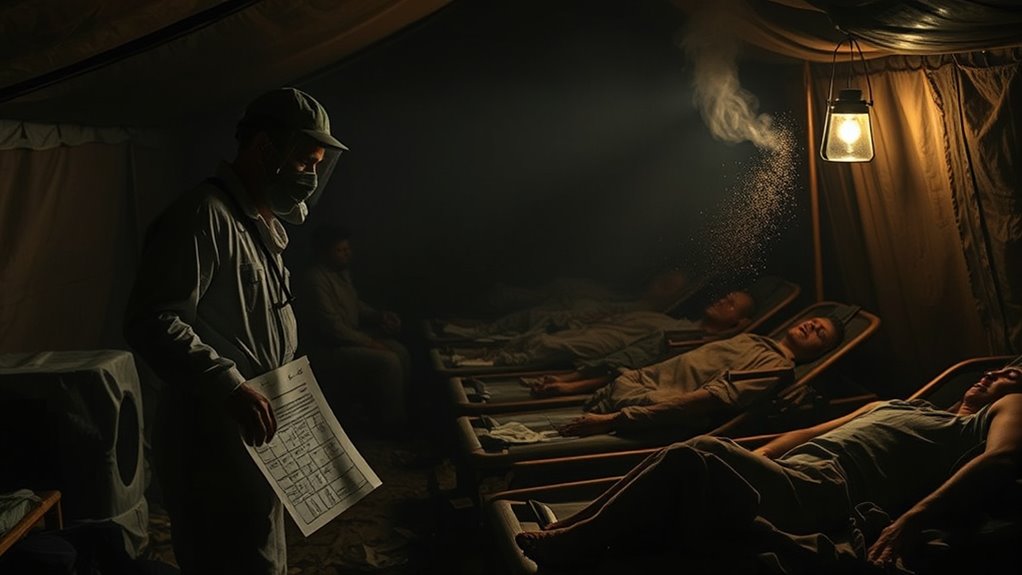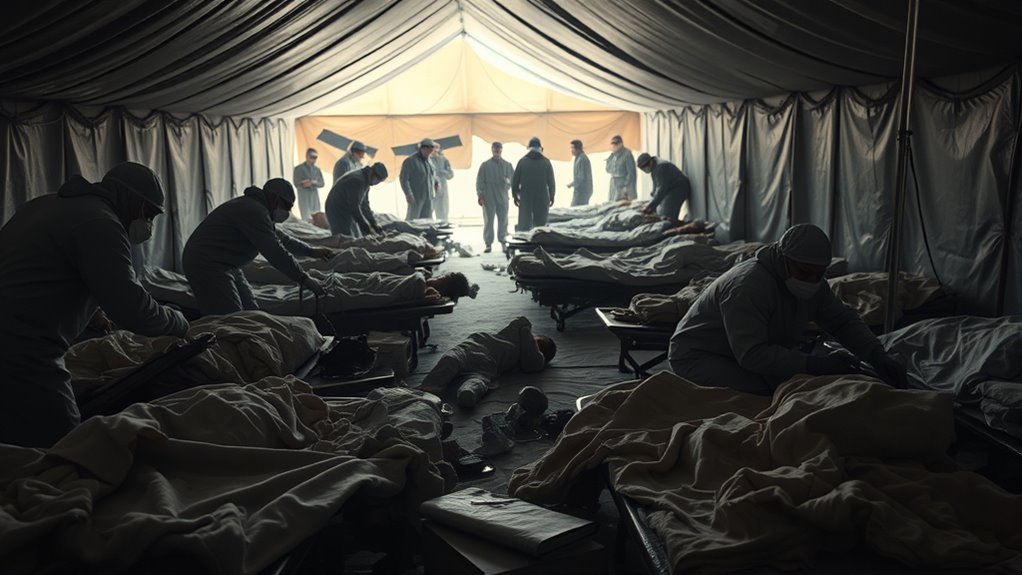When facing scarce resources in disasters, you must balance fairness, urgency, and maximizing benefits. Ethical triage prioritizes saving the most lives while respecting individual needs, but tough choices can create moral dilemmas and emotional distress. Using established frameworks and transparent policies helps guide decisions and maintain trust. If you want to understand how these principles work together in emergency situations, exploring more will give you a clearer picture.
Key Takeaways
- Triage prioritizes maximizing benefits, often focusing on saving the most lives under resource constraints.
- Ethical decision-making balances fairness, urgency, and recovery potential, guided by adaptable frameworks.
- Transparency and consistency in triage protocols promote fairness and public trust during crises.
- Cultural considerations and stakeholder involvement ensure ethically appropriate and context-sensitive triage decisions.
- Emotional and moral challenges require resilience, clear guidelines, and support for healthcare providers facing tough choices.
Foundations of Medical Triage Ethics

Understanding the foundations of medical triage ethics requires recognizing how healthcare providers make difficult decisions under resource constraints. Resource prioritization becomes central, forcing providers to determine who receives immediate care and who waits. These choices often lead to moral conflict, as clinicians balance fairness, urgency, and the potential for recovery. You might feel torn between saving the most lives and treating patients equally. Triage decisions are guided by the need to maximize benefits while managing scarce resources, but moral conflicts arise when values clash—such as individual needs versus the greater good. These ethical challenges demand careful judgment, clear criteria, and an understanding that every decision carries weight. Additionally, color accuracy impacts the perception of fairness in triage by influencing how clearly providers can assess patients’ conditions visually. Ultimately, this foundation shapes how providers navigate complex situations in disaster response, balancing compassion with practicality.
Principles Guiding Resource Allocation

What principles should guide how you allocate limited healthcare resources? Resource prioritization is key. You should focus on saving the most lives and maximizing benefits, which often means prioritizing those with the greatest chance of survival. Fairness also matters; you need to treat people equitably, avoiding biases based on age, gender, or social status. Transparency is essential—your decision process should be clear and consistent. These principles help navigate the moral dilemmas that arise when resources are scarce, forcing you to weigh individual needs against the collective good. While no approach is perfect, applying these guiding principles ensures your resource allocation is just, ethical, and aimed at achieving the best outcomes during crises. Incorporating performance metrics can further support fair and effective decision-making processes. Recognizing the importance of regional legal resources can also influence the fairness and efficiency of triage decisions, especially in complex or high-stakes situations. Additionally, understanding resource limitations can aid in developing more ethical and practical allocation strategies during emergencies. Using evidence-based guidelines can help standardize triage protocols across different settings, improving overall fairness. To improve decision-making, it is also beneficial to consider ethical frameworks that provide structured guidance in morally complex scenarios.
Challenges and Dilemmas in Crisis Situations

During crisis situations, the principles guiding resource allocation are put to the test as healthcare providers face unprecedented challenges. You’ll encounter priority conflicts, where deciding who receives limited resources becomes a difficult moral dilemma. These choices often force you to weigh the needs of one patient against another, raising questions about fairness and utility. At the same time, emotional burdens weigh heavily on your shoulders, as you grapple with the distress of making life-and-death decisions under pressure. The stress of these dilemmas can lead to moral distress, especially when resources are insufficient to meet everyone’s needs. Recognizing the importance of goal setting and emotional regulation can help in maintaining resilience and clarity, yet the emotional toll remains significant, reminding you of the profound human impact behind every triage decision. Moreover, understanding the availability of resources, such as portable medical equipment, can influence the choices made during crises and help in prioritizing effectively. Being aware of precious metals investment assets, like gold coins and bars, can also serve as contingency planning for long-term financial security in uncertain times. Additionally, having a clear understanding of bedroom layout and organization can provide psychological comfort and stability amidst chaos, emphasizing the importance of environment in maintaining mental health during crises. Incorporating knowledge of economic growth factors can also assist healthcare administrators in resource planning and ensuring sustainability during prolonged emergencies.
Frameworks for Ethical Decision-Making

When faced with tough triage decisions, healthcare providers turn to ethical frameworks to guarantee their choices and affirm consistency. These frameworks help navigate moral dilemmas by offering structured guidance, such as utilitarian principles to maximize overall benefits or egalitarian approaches to guarantee fairness. Cultural considerations also play a crucial role, as they influence values and perceptions of what constitutes ethical care across different communities. By applying these frameworks, you can balance competing interests, respect individual dignity, and address moral dilemmas more transparently. This systematic approach helps prevent biases and affirms that decisions align with shared ethical standards, even under pressure. Recognizing the role of ethical hacking in cybersecurity emphasizes the importance of structured, systematic approaches to complex challenges. Additionally, understanding the intricacies of medical resource allocation can inform more equitable triage decisions during crises. For example, attention to headphone compatibility can be crucial when setting up communication devices for emergency responders, ensuring reliable connections in critical moments. Incorporating insights from narcissistic manipulation can also help clinicians recognize and mitigate biases that may influence decision-making processes. Ultimately, ethical frameworks serve as essential tools to support fair, consistent, and culturally sensitive triage decisions during crises.
Future Directions and Policy Considerations

Looking ahead, shaping effective policies for medical triage requires integrating ethical principles with practical strategies to handle future crises. You need clear guidelines for resource prioritization that balance fairness, utility, and respect for individuals. Policy development should involve stakeholders from diverse backgrounds to ensure legitimacy and inclusivity. Emphasizing transparency and consistency helps build public trust and supports ethical decision-making during emergencies. You should also consider adaptable frameworks that can respond to different disaster scenarios, ensuring flexibility without sacrificing core ethical standards. Incorporating lessons learned from past crises, coupled with ongoing research, will strengthen preparedness. For example, understanding popular juice brands can inform nutritional support strategies during recovery phases. Additionally, familiarizing healthcare teams with hydrocolloid technology and its role in wound healing can optimize treatment protocols in disaster settings. Promoting space and organization within medical facilities can improve efficiency and reduce errors during high-pressure situations. Implementing AI-driven content clusters can further assist in disseminating critical information and training resources for emergency responders. Developing ethical frameworks that adapt to diverse situations will be essential for guiding decision-making under pressure. Ultimately, proactive policies will guide healthcare providers through difficult choices, ensuring that scarce resources are allocated ethically and effectively during future disasters.
Frequently Asked Questions
How Do Cultural Differences Influence Triage Decisions?
Cultural beliefs greatly influence triage decisions by shaping how you perceive health, illness, and fairness. Your decision making is affected by values, traditions, and social norms that prioritize certain lives or treatments. You may focus on family ties, community needs, or spiritual considerations, which can lead to different triage priorities. Recognizing these cultural differences helps guarantee more respectful, equitable care, even when resources are limited or tough choices are needed.
What Role Does Patient Autonomy Play in Crisis Triage?
You might wonder how patient autonomy influences crisis triage. During emergencies, you still aim to respect patients’ rights, which involves informed consent whenever possible. However, ethical dilemmas arise when resources are limited, forcing you to prioritize care based on urgency rather than individual preferences. Balancing respect for autonomy with the need to save lives challenges your decision-making, requiring compassion and adherence to ethical standards even amid chaos.
Are There Legal Liabilities for Healthcare Providers Making Triage Choices?
Like walking a tightrope, making triage choices can be risky. You might face legal liabilities if your decisions are challenged, but many laws provide liability protection for healthcare providers acting in good faith during crises. Understanding legal accountability helps you navigate tough decisions confidently, knowing that following established protocols can shield you from liability. Ultimately, informed, ethical triage is essential to balancing patient care and legal responsibilities.
How Do Resource Limitations Impact Mental Health of Healthcare Workers?
You face significant resource limitations that heighten burnout risks among healthcare workers. These shortages cause constant stress, forcing you to make difficult decisions and manage overwhelming workloads. As a result, your emotional resilience can weaken, leading to feelings of frustration and exhaustion. To cope, you need support systems in place that bolster mental health, helping you maintain resilience despite the intense pressures and resource constraints.
Can Triage Protocols Be Adapted for Non-Disaster Contexts?
You can adapt triage protocols for non-disaster settings by applying ethical frameworks that prioritize fairness and transparency. Policy adaptations help guarantee these protocols suit everyday healthcare, balancing resource use with patient needs. By integrating ethical considerations, you create clear guidelines that support decision-making in routine care, promoting consistency and trust. This approach ensures triage principles are ethically sound, even when resource constraints are less severe.
Conclusion
In managing scarce resources during disasters, you face tough choices that test your ethics and compassion. Remember, honesty is the best policy, and fairness guides your decisions. By embracing ethical frameworks and clear principles, you can make difficult calls with integrity. As the saying goes, “Where there’s a will, there’s a way.” Trust that thoughtful, principled action helps you turn chaos into clarity, ensuring the best care for those in greatest need.










